The 2030 Agenda for Sustainable Development, adopted by all United Nations Member States in 2015, provides a shared blueprint for peace and prosperity for people and the planet, now and into the future. Chemicals and wastes provide important contribution for the 2030 Agenda for Sustainable Development. The sound management of chemicals and wastes give solutions for detoxifying air, water and soil, promoting the use of safe chemicals and chemical alternatives, minimizing the use of toxic substances in production and consumption, preventing or reducing the generation of hazardous and other wastes, and safely managing them. The sound management of chemicals and wastes is also important in areas such as education, gender equality and climate change. Accordingly, the sound management of chemicals and wastes has a key cross‐cutting nature and contributes to overcoming global and local challenges.
The issue of chemicals and hazardous wastes demonstrates the opportunities at hand for the implementation of the SDGs, building on existing global and regional commitments and initiatives. Among the key global instruments that address chemicals and wastes management are the Basel Convention on the Control of Transboundary Movements of Hazardous Wastes and Their Disposal, the Rotterdam Convention on the Prior Informed Consent Procedure for Certain Hazardous Chemicals and Pesticides in International Trade and the Stockholm Convention on Persistent Organic Pollutants.
For more information about the Sustainable Development and the 2030 Agenda for Sustainable Development please visit: https://sustainabledevelopment.un.org/ and the outcome document transforming our world: the 2030 Agenda for Sustainable Development.
Goals
At its heart are the 17 Sustainable Development Goals (SDGs), which are an urgent call for action by all countries - developed and developing - in a global partnership. They recognize that ending poverty and other deprivations must go hand-in-hand with strategies that improve health and education, reduce inequality, and spur economic growth – all while tackling climate change and working to preserve our oceans and forests.
Chemicals and wastes are reflected in a number of goals and targets, including goal 2 “sustainable agriculture”, goal 3 “Good health and well-being”, goal 6 “Clean water and sanitation”, goal 11 “Sustainable cities and communities”, goal 14 “Life below water” and goal 12 “Responsible production and consumption”.
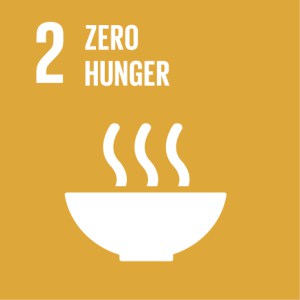
|
Goal 2. End hunger, achieve food security and improved nutrition and promote sustainable agriculture |
|
|
Target
2.4 By 2030, ensure sustainable food production systems and implement resilient agricultural practices
that increase productivity and production, that help maintain ecosystems,
that strengthen capacity for adaptation to climate change, extreme weather,
drought, flooding and other disasters and that progressively improve land and
soil quality
|
Indicator
2.4.1 Proportion of agricultural area under productive and sustainable
agriculture
|
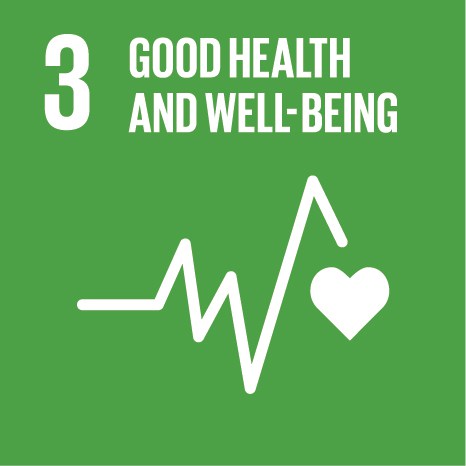 |
Goal 3. Ensure healthy lives and promote well-being for all at all ages |
|
|
Target
3.9 By 2030, substantially reduce the number of deaths and illnesses from hazardous chemicals and air,
water and soil pollution and contamination
|
Indicators
3.9.1 Mortality rate attributed to household and ambient air pollution
|
|
3.9.2 Mortality rate attributed to unsafe water, unsafe
sanitation and lack of hygiene (exposure to unsafe WASH services)
|
|
3.9.3 Mortality rate attributed to unintentional Poisoning
|
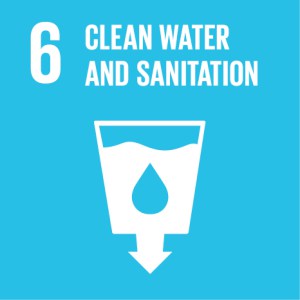 |
Goal 6. Ensure availability and sustainable management of water and sanitation for all |
|
|
Target
6.3 By 2030, improve water quality by reducing pollution, eliminating dumping and minimizing release of
hazardous chemicals and materials, halving the proportion of untreated
wastewater and substantially increasing recycling and safe reuse globally
|
Indicators
6.3.1 Proportion of wastewater safely treated
|
|
6.3.2 Proportion of bodies of water with good ambient water quality
|
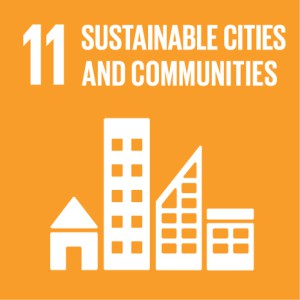 |
Goal 11. Make cities and human settlements inclusive, safe, resilient and sustainable
|
|
|
Target
11.6 By 2030, reduce the adverse per capita environmental impact of cities, including by paying special attention to air quality and municipal and other waste management
|
Indicators
11.6.1 Percentage of urban solid waste regularly collected and with adequate final discharge with regard to the total waste generated by the city
|
|
11.6.2 Annual mean levels of fine particulate matter (e.g. PM2.5 and PM10) in cities (population weighted)
|
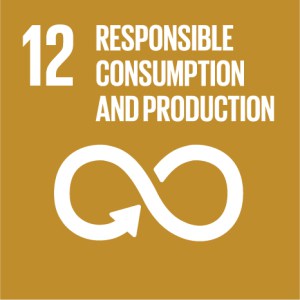
|
Goal 12. Ensure sustainable consumption and production patterns
|
|
|
Targets
12.4 By 2020, achieve the environmentally sound management of chemicals and all wastes throughout their
life cycle, in accordance with agreed international frameworks, and
significantly reduce their release to air, water and soil in order to minimize
their adverse impacts on human health and the environment
|
Indicators
12.4.1 Number of Parties to international multilateral environmental agreements on hazardous waste, and other chemicals that meet their commitments and obligations in transmitting information as required by each relevant agreement
|
|
12.4.2 Hazardous waste generated per capita, proportion of hazardous waste treated and by type of treatment
|
|
12.5 By 2030, substantially reduce waste generation
through prevention, reduction, recycling and reuse
|
12.5.1 National recycling rate, tons of material recycled
|
Indicators
The global indicator framework for Sustainable Development Goals was developed to monitor the achievement of Sustainable Development Goals and targets. The global indicator framework includes 231 unique indicators.
There are a number of global indicators relating to the area of chemicals and wastes management. Currently the Secretariat of the Basel, Rotterdam and Stockholm Conventions provides data for the indicator 12.4.1.
The indicator 12.4.1 relates to: “the number of Parties to international multilateral environmental agreements on hazardous waste and other chemicals that meet their commitments and obligations in transmitting information as required by each relevant agreement”.
The BRS Secretariat reports on the indicator 12.4.1 using the following parameters to measure progress made by State Parties in achieving environmentally sound management of chemicals and wastes: information that each Party, whatever its national circumstances, has the obligation to transmit to the Secretariat: designated country contacts under each Convention, national implementation plans under the Stockholm Convention, national reports under the Basel and Stockholm conventions and import responses under the Rotterdam Convention.
For more information about the SDGs indicators please visit the website:
https://unstats.un.org/sdgs/indicators/indicators-list/
High-Level Political Forum
The High-Level Political Forum is the main United Nations platform on sustainable development and it has a central role in the follow-up and review of the 2030 Agenda for Sustainable Development the Sustainable Development Goals (SDGs) at the global level.
Conferences of the Parties to the Basel, Rotterdam and Stockholm Conventions submit written inputs to the High-Level Political Forum on the relevance and contribution of each of the convention:
Input to the High-Level Political Forum by the COP to the Basel Convention in 2023
Input to the High-Level Political Forum by the COP to the Rotterdam Convention in 2023
Input to the High-Level Political Forum by the COP to the Stockholm Convention in 2023
Input to the High-Level Political Forum by the COP to the Basel Convention in 2022
Input to the High-Level Political Forum by the COP to the Rotterdam Convention in 2022
Input to the High-Level Political Forum by the COP to the Stockholm Convention in 2022
Input to the High-Level Political Forum by the COP to the Basel Convention in 2021
Input to the High-Level Political Forum by the COP to the Rotterdam Convention in 2021
Input to the High-Level Political Forum by the COP to the Stockholm Convention in 2021
Input to the High-Level Political Forum by the COP to the Basel Convention in 2020
Input to the High-Level Political Forum by the COP to the Rotterdam Convention in 2020
Input to the High-Level Political Forum by the COP to the Stockholm Convention in 2020
The Secretariat of the Basel, Rotterdam and Stockholm Conventions submits written inputs to the High-Level Political Forum on the relevance and contribution of each of the convention:
Input to the High-Level Political Forum by the BRS Secretariat in 2023
The Secretariat contributes to the High-Level Political Forum by providing input into the Progress towards the Sustainable Development Goals by the UN Secretary-General (2018, 2019, 2020)
https://sustainabledevelopment.un.org/hlpf
UN Sustainable Development Cooperation Framework
The 2030 Agenda requires changes to the UN development system for the emergence of a new generation of country teams, centred on a strategic UN Development Assistance Framework and led by an impartial, independent and empowered resident coordinator.
The United Nations Sustainable Development Cooperation Framework (formerly named United Nations Development Assistance Framework) is the most important instrument for planning and implementation of the UN development activities at country level. This is in line with Member States' call for a UN development reform to boost coordination to support countries to achieve the 2030 Agenda. The Cooperation Framework is designed to be the primary instrument for planning and implementation of the UN development activities at country level in support of the implementation of the 2030 Agenda for Sustainable Development. The Cooperation Framework now guides the entire programme cycle, driving planning, implementation, monitoring, reporting and evaluation of collective UN support for achieving the 2030 Agenda. As such, the framework captures country needs and tailors the UN development system response and presence on the ground.
Countries are expected to start implementing their new Cooperation Framework programme cycle in 2021, 2022 or 2023.
For more information on the Cooperation Framework, please visit: https://unsdg.un.org/2030-agenda/cooperation-framework.